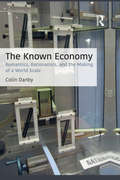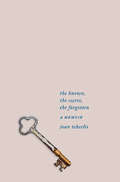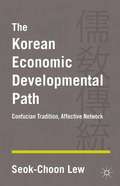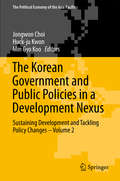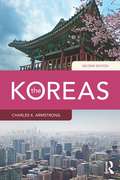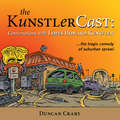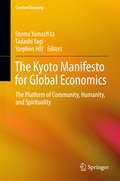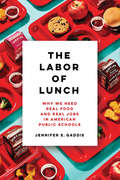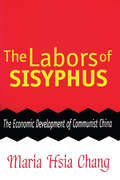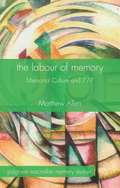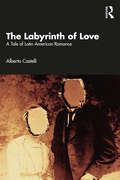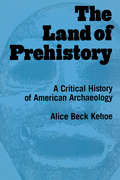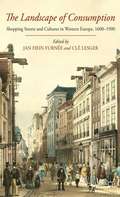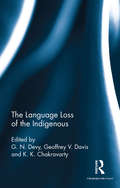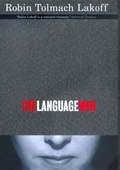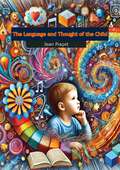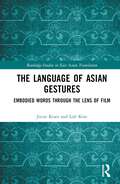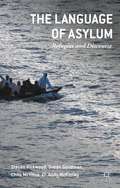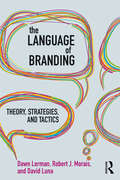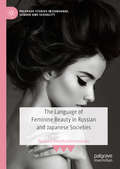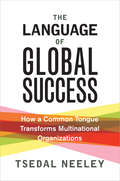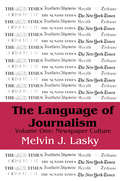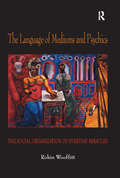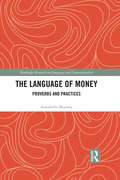- Table View
- List View
The Known Economy: Romantics, Rationalists, and the Making of a World Scale (CRESC)
by Colin DanbyWhy do critics and celebrants of globalization concur that international trade and finance represent an inexorable globe-bestriding force with a single logic? The Known Economy shows that both camps rest on the same ideas about how the world is scaled. Two centuries ago romantic and rationalist theorists concurred that the world was divided into discrete nations, moving at different rates toward a "modernity", split between love and money. Though differing over whether this history is tragedy or triumph, they united in projecting an empty "international" space in which a Moloch-like global capitalism could lurk. The Known Economy tracks the colonial development of national accounting and re-examines the ways gender and heteronormativity are built in to economic representation. It re-interprets the post-WWII spread of standardized economic statistics as the project of international organizations looking over the shoulders of national governments, rather than the expanding power of national governments over populations.
The Known, the Secret, the Forgotten: A Memoir
by Joan WheelisCrafted from slivers of reminiscence and reflection, Joan Wheelis’s beautifully written memoir explores the intricacies of attachment and the perils of love and inevitable loss. We glimpse the author’s childhood in San Francisco and her relationship with her distinguished psychoanalyst parents through a series of jewel-like vignettes. She explores her past through her questions about life and the lessons her parents taught her about the existence of God, how to cut a napoleon and build a fire, and the hazards of self-deception. Into this tapestry of memory Wheelis, also a psychoanalyst, weaves profound reflections from adulthood. Wrestling with the loss of her parents, the author faces the questions of what matters and what remains of their lives. She reckons with their histories and legacies, tracing the heritage of love and conflict through the generations. As she revisits the rooms and landscapes of her past, her prose takes on the poetic logic of memory itself.
The Korean Economic Developmental Path
by Seok-Choon LewThis book defines the Korean development as the moral economy of growth derived from a synergy between strong state and strong society and argues that Confucian cultural orientation has played a critical role in the process.
The Korean Government and Public Policies in a Development Nexus
by Min Gyo Koo Huck-Ju Kwon Jongwon ChoiIn the postwar period, Korea's economic and social-political metamorphosis is a rare example of a successful transition from one of the world's poorest developing countries to a highly sophisticated industrial society--an experience which many developing countries are keen to emulate The change is particularly significant as Korea was able to reduce poverty and keep social inequality at a modest level during its rapid economic development. This volume analyzes the Korean transition in regards to the political and institutional foundation of its government and public policies The government of Korea single-mindedly carried out public policies to stimulate economic growth, but the government and public policies have themselves been affected and changed by the process The contention of this volume is that the transition of Korean society and the evolution of the Korean government are the results of two-way interactions In this context, the volume analyzes the way in which the dynamics of public administration were shaped within the Korean government and the kinds of public policies and instruments that were adopted to encourage this economic and social development This analysis will allow a more complete understanding of the economic and social transformation of Korea Surprisingly, there is a paucity of research on this aspect--a gap which this volume seeks to fill This volume shows that it is necessary to maintain consistency and coherence in government and public policy in order to achieve economic and social transformation, making it of interest to both scholars and policy-makers concerned with development in the Asia-Pacific.
The Koreas
by Charles K. ArmstrongPresenting a succinct, historically informed introduction to North and South Korea, the second edition of The Koreas considers the radically different ways these countries have dealt with the growing challenges of globalization. Since the first edition’s publication, the economic, political, and social differences have only intensified, making evident the relevancy and importance of Armstrong’s work, in understanding the Koreas now and in the future. Ultimately, The Koreas is a crisp, engaging primer of Korea and the Korean people in the contemporary world. This book is ideal for many courses in a variety of disciplines, including politics, history, international business, and Asian studies.
The KunstlerCast: Conversations with James Howard Kunstler
by Duncan CraryBased off the popular podcast, this book collects one man’s conversations with an outspoken social critic on the negative effects of the suburbs.James Howard Kunstler has been described as “one of the most outrageous commentators on the American built environment.” An outspoken critic of suburban sprawl, Kunstler is often controversial and always provocative. The KunstlerCast is based on the popular weekly podcast of the same name, which features Kunstler in dialogue with author Duncan Crary, offering a personal window into Kunstler’s worldview.Presented as a long-form conversational interview, The KunstlerCast revisits and updates all the major ideas contained in Kunstler’s body of work, including:The need to rethink current sources of transportation and energyThe failure of urban planning, architecture and industrial societyAmerica’s plastic, dysfunctional cultureThe reality of peak oilWhether sitting in the studio, strolling city streets, visiting a suburban mall or even “Happy Motoring,” the grim predictions Kunstler makes about America’s prospects are leavened by his signature sharp wit and humor. This book is rounded out by commentary, footnotes and supplemental vignettes told from the perspective of an “embedded” reporter on the Kunstler beat.Readers may or may not agree with the more dystopian of Kunstler’s visions. Regardless, The KunstlerCast is bound to inspire a great deal of thought, laughter, and hopefully, action.Praise for The KunstlerCast“A bracing dose of reality for an unreal world.” —Stephen J. Dubner, co-author of Freakonomics and SuperFreakonomics“Erudite, eloquent . . . with good humor about the hilariously grotesque North American nightmare of car-addicted suburban sprawl.” —Dmitry Orlov, author of Reinventing Collapse“Prepare to be enlightened, infuriated and amused.” —Gregory Greene, Director, The End of Suburbia“So enlightening yet casual that the reader feels like they’re eavesdropping into the den of Kunstler’s prodigious mind.” —Andrew D. Blechman, author of Leisureville
The Kyoto Manifesto for Global Economics: The Platform Of Community, Humanity, And Spirituality (Creative Economy Ser.)
by Stomu Yamash’ta Tadashi Yagi Stephen HillThis book confronts the failings of current global economics to deliver the equity, sustainability and community empowerment which humanity now needs to handle a troubled future. The volume proposes an economy built from our society, not the other way around.The Kyoto Manifesto was built, layer by layer, over a period of 4 years, based on broad-ranging international symposia held in Kyoto between 2014 and 2017, hosted by the Center for the Creative Economy, Doshisha University. Not stopping at theory and untested ideas however, the Manifesto proposes practical action that will make a difference, including in the problematic technological and ecological context of humanity’s immediate and long-term future.The book is unique and innovative for it moves adventurously across very broad territory. The Manifesto draws from world philosophic arguments, including, specifically, a critique of “liberalism”, further, exploring sociology, cultural anthropology, politics, primatology and early humanity, even quantum physics. Argument is set within mainstream post-1972 economics and political economics as well as direct practical experience working to empower disadvantaged communities through the United Nations.Most importantly, the book’s analysis is deeply informed by the practice of searching for what is “sacred”, the ultimate essence of our humanity, what we can be as a human race—empowered, fulfilled individuals, deeply sharing and caring for each other across our separate cultures and lives. Stomu Yamash’ta’s On Zen performances, set the context for the Symposia, bringing different religions and cultures together across their dividing boundaries into a coherent search for peace and harmony through sacred music. Informed by alternate cultural paradigms for economics, the book probes deeply into philosophies and practices that already exist within Eastern and Western societies, and offer lessons for our future.The result is an economics that stresses harmony with nature, and balance in social relations. It places an emphasis on community—human sharing and trust—as a platform for our future, not separate from the global economy but integrated into its very foundations. This is a book for all who care: a plan for our sustainable future built from the best of what our humanity is and can offer.
The Labor of Lunch: Why We Need Real Food and Real Jobs in American Public Schools (California Studies in Food and Culture #70)
by Jennifer E. GaddisThere’s a problem with school lunch in America. Big Food companies have largely replaced the nation’s school cooks by supplying cafeterias with cheap, precooked hamburger patties and chicken nuggets chock-full of industrial fillers. Yet it’s no secret that meals cooked from scratch with nutritious, locally sourced ingredients are better for children, workers, and the environment. So why not empower “lunch ladies” to do more than just unbox and reheat factory-made food? And why not organize together to make healthy, ethically sourced, free school lunches a reality for all children? The Labor of Lunch aims to spark a progressive movement that will transform food in American schools, and with it the lives of thousands of low-paid cafeteria workers and the millions of children they feed. By providing a feminist history of the US National School Lunch Program, Jennifer E. Gaddis recasts the humble school lunch as an important and often overlooked form of public care. Through vivid narration and moral heft, The Labor of Lunch offers a stirring call to action and a blueprint for school lunch reforms capable of delivering a healthier, more equitable, caring, and sustainable future.
The Labors of Sisyphus: Economic Development of Communist China
by Joan RolandAlmost a half century has passed since the inception of the People's Republic cf China. In that time a charismatic leader has ruled and died, leaving a wake of .Destruction in his quest to transform China. In that time, too, the PRC's most powerful ally and mentor, the Soviet Union, has dismantled and announced that jcmmunism had failed. Today, China fluctuates between tradition and modernity, ideology and pragmatism, between an antiquated collectivist ethic and a new spirit rf individualism. It is a country precariously suspended between past and future. Maria Hsia Chang's The Labors of Sisyphus is a long overdue reassessment of rie meaning and purpose of the Chinese communist revolution. In it, she discusses ihe thought of Mao Zedong and Deng Xiaoping, reform and its dilemmas, regionalism in greater China and autonomous areas, and nationalism. She also eyjnines China's immediate present and uncertain future. If it manages to transform economic growth into development, China--filled with natural resources and a large, capable labor force--has the potential to become a world superpower. It could also collapse under the weight of its own problems: regionalism, a flawed state sector, corruption, and a pronounced decline in state capacity. If China succeeds, an imposing new economic power will enter the global stage, one that is often arbitrary and prone to despotism and xenophobia, unless it is tempered by political reform. Prior accounts of communist China have failed to capture China's evolving present In all its complexity and variety, misrepresenting Maoist China In the process. Information shortfall was partly to blame: as recently as August 1994, the Chinese government itself decried falsification of statistics by government officials and cadres. Sinologists in the 1960s and 1970s had to approach analysis of contemporary China with clear recognition of the limitations involved and the questionable validity of the factual sources available. Maria Hsia Chang lends structure, meaning, and purpose to the very complex recent political and historical past of communist China. With greater access to more accurate information, Chang is able to analyze objectively, without political motive or intention, providing readers with a fresh look at the People's Republic. Her pathbreaking work will be of interest to scholars of international economics and politics, sinologists, and historians.
The Labour of Memory
by Matthew AllenThis book presents a study of remembrance practices emerging after the 2005 London bombings. Matthew Allen explores a range of cases that not only illustrate the effects of the organisation of remembrance on its participants, but reveal how people engaged in memorial culture to address difficult and unbearable conditions in the wake of 7/7.
The Labyrinth of Love: A Tale of Latin American Romance
by Alberto CastelliThis book studies the various narrative shades of love in twentieth-century Latin American fiction. It examines writings by Isabel Allende, Roberto Arlt, García Márquez, and Mario Vargas Llosa. The author provides a close textual reading of each novel and discusses how humans make sense of their lives through love. He shifts the focus of these writings from political violence and historical disillusionment to the illusion of love.An important contribution to Latin American literary criticism, this book will be of interest to students and scholars of literature, history, Latin American literature, philosophy, ethics, aesthetics, comparative literature, and sociology.
The Land of Prehistory: A Critical History of American Archaeology
by Alice Beck KehoeFirst published in 1998. Routledge is an imprint of Taylor & Francis, an informa company.
The Landscape of Consumption: Shopping Streets and Cultures in Western Europe, 1600–1900
by Jan Hein Furnée Clé LesgerThis volume brings together research on retailing, shopping and urban space; themes that have attracted wide interest in recent decades. The authors argue that the 'modernity' of the nineteenth century is often over-emphasised at the expense of recognising earlier innovation.
The Language Loss of the Indigenous
by G. N. Devy Geoffrey V. Davis K. K. ChakravartyThis volume traces the theme of the loss of language and culture in numerous post-colonial contexts. It establishes that the aphasia imposed on the indigenous is but a visible symptom of a deeper malaise — the mismatch between the symbiotic relation nurtured by the indigenous with their environment and the idea of development put before them as their future. The essays here show how the cultures and the imaginative expressions of indigenous communities all over the world are undergoing a phase of rapid depletion. They unravel the indifference of market forces to diversity and that of the states, unwilling to protect and safeguard these marginalized communities. This book will be useful to scholars and researchers of cultural and literary studies, linguistics, sociology and social anthropology, as well as tribal and indigenous studies.
The Language War
by Robin Tolmach LakoffAre there natural boundaries to our field? How do we differ (if we do) from rhetoricians, literary critics, psychoanalysts, appellate courts, political spin doctors, and others who, theoretically and practically, determine what language means or accomplishes?
The Language and Thought of the Child: Selected Works Vol 5 (Routledge Classics Ser.)
by Jean PiagetExplore the fascinating world of childhood cognition with Jean Piaget's groundbreaking work, "The Language and Thought of the Child." This seminal book provides an in-depth analysis of how children develop language and thought, offering profound insights into the cognitive processes that shape their understanding of the world.Jean Piaget, a renowned Swiss psychologist, revolutionized our understanding of child development through his meticulous observations and innovative research. In "The Language and Thought of the Child," Piaget delves into the intricacies of children's language acquisition and cognitive development, presenting his findings with clarity and rigor.The book examines the stages of language development, from the early use of gestures and simple words to the complex structures of sentences and logical reasoning. Piaget explores how children use language to express their thoughts, interact with their environment, and solve problems. He identifies key patterns and stages in their cognitive growth, highlighting the transition from egocentric speech to socialized communication.Through detailed case studies and observational data, Piaget reveals the ways in which children’s thinking evolves in tandem with their linguistic abilities. He discusses concepts such as animism, artificialism, and moral reasoning, providing a comprehensive overview of the cognitive milestones that characterize early childhood."The Language and Thought of the Child" is not just a theoretical text but also a practical guide for parents, educators, and psychologists. Piaget’s insights offer valuable guidance on how to support and nurture children's intellectual and linguistic development, emphasizing the importance of interactive learning and constructive play.This book remains a cornerstone in the field of developmental psychology, celebrated for its depth of analysis and enduring relevance. Jean Piaget’s work continues to inspire and inform those who study the complex interplay between language and thought in children. Whether you are a student of psychology, an educator, or a parent, "The Language and Thought of the Child" provides essential knowledge and inspiration for understanding and fostering the intellectual growth of young minds.
The Language of Asian Gestures: Embodied Words Through the Lens of Film (Routledge Studies in East Asian Translation)
by Jieun Kiaer Loli KimThe Language of Asian Gestures explores Asian gestures as a non-verbal language within the context of films and dramas.This book provides a cross-cultural Asian perspective on a range of important common gestures and their meanings, covering a range of Asian regions including Korea, China, Hong Kong, Japan, Taiwan, Vietnam, Singapore, Thailand, Indonesia, the Philippines, India, and Pakistan. While most studies focus on text-based communication, gestures find themselves overshadowed by text and speech. Asian gestures, too, often reside in the shadow of Eurocentric viewpoints. This book will shift this dynamic and amplify the voices that have typically been marginalised within 20th-century Eurocentric discussions.The book will be informative for students and researchers interested in Asian languages, cultures, film studies, and pragmatics. It bridges the gap between words and gestures, unveiling a world of concealed meanings and enriching our understanding of diverse forms of expression.
The Language of Asylum: Refugees And Discourse
by Simon Goodman Steve Kirkwood Chris McVittie Andy McKinlayThe early part of the 21st century has been marked by widespread social upheaval and geographical displacement of people. This book examines how refugees, asylum-seekers, locals and professional refugee workers make sense of asylum and refuge in the context of current UK asylum policies.
The Language of Branding: Theory, Strategies, and Tactics
by Dawn Lerman Robert J. Morais David LunaThe Language of Branding: Theory, Strategies and Tactics shows marketers how to use language successfully to improve brand value and influence consumer behavior. Luna and Lerman are among only a few researchers who take a multidisciplinary perspective on the ways language influences how consumers act. Together with Morais, an anthropologist engaged in market research, they show how understanding the power of language can impact the essence – and sales – of a brand. The book covers the fundamentals of brand language and applications for an array of marketing initiatives. Readers will learn why brand language matters, how language is used in marketing, and how to build a brand strategy that capitalizes on the richness and complexity of language. This book includes real-world case histories that demonstrate vividly how brand language is created and exercises that enable both students of marketing and marketing professionals to apply the book’s concepts and stimulate class discussion. The Language of Branding: Theory, Strategies and Tactics can be used in a number of courses, including consumer behavior, branding, advertising, linguistics, and communications.
The Language of Contention
by Sidney TarrowThis book examines the relations between the material and political bases of contentious politics and the construction, diffusion and endurance of contentious language. Beginning with the language of revolution developed from the seventeenth to the nineteenth centuries, it examines contentious language at work, in gender and race relations and in nationalist and ethnic movements. It closes with an examination of emotions in contentious politics, reflecting on the changes in political language since 9/11 and assessing the impact of religion and recent innovations in electronic communication on the language of politics.
The Language of Feminine Beauty in Russian and Japanese Societies (Palgrave Studies in Language, Gender and Sexuality)
by Natalia KonstantinovskaiaThis book conducts a cross-linguistic and cross-cultural study of 'women’s language' as it pertains to feminine beauty. It examines the ideological constructs of beauty and femininity in the cultures of Japan and Russia, as embodied through televised beauty ads, and relates them to the real-world language practices of Japanese and Russian women. The author traces the reciprocal connection between women’s real and imagined language in the construction of ideals of beauty and femininity, revealing the complex ways women respond to ideological expectations regarding language use: assimilating, transforming, and subverting ideologized language and the assumptions implicit in it. She also demonstrates ways in which women alter the texture of language by appropriating 'masculine' language for their own purposes, shifting the meaning and correlates of linguistic items and structures. This book will be of interest to students and scholars of sociolinguistics, language and gender, cultural and media studies, and Russian and Japanese culture.
The Language of Global Success: How a Common Tongue Transforms Multinational Organizations
by Tsedal NeeleyFor nearly three decades, English has been the lingua franca of cross-border organizations, yet studies on corporate language strategies and their importance for globalization have been scarce. In The Language of Global Success, Tsedal Neeley provides an in-depth look at a single organization—the high-tech giant Rakuten—in the five years following its English lingua franca mandate. Neeley’s behind-the-scenes account explores how language shapes the ways in which employees who work in global organizations communicate and negotiate linguistic and cultural differences.Drawing on 650 interviews conducted across Rakuten’s locations in Brazil, France, Germany, Indonesia, Japan, Taiwan, Thailand, and the United States, Neeley argues that an organization’s lingua franca is the catalyst by which all employees become some kind of “expat”—someone detached from their mother tongue or home culture. Through her unfettered access to the inner workings of Rakuten, she reveals three distinct social groups: “linguistic expats,” who live in their home country yet have to give up their native language in the workplace; “cultural expats,” or native speakers of the lingua franca, who struggle with organizational values that are more easily transmitted after language barriers are removed; and finally “linguistic-cultural expats,” who, while native to neither the lingua franca nor the organization’s home culture, surprisingly have the easiest time adjusting to language changes. Neeley demonstrates that language can serve as the conduit for an unfamiliar culture, often in unexpected ways, and that there are lessons to be learned for all global companies as they confront language and culture challenges.Examining the strategic use of language by one international corporation, The Language of Global Success uncovers how all organizations might integrate language effectively to tap into the promise of globalization.
The Language of Journalism: Volume 1, Newspaper Culture (Language Of Journalism Ser.)
by Melvin J. LaskyThe newspaper is to the twentieth century what the novel was for the nineteenth century: the expression of popular sentiment. In the first of a three-volume study of journalism and what it has meant as a source of knowledge and as a mechanism for orchestrating mass ideology, Melvin J. Lasky provides a major overview. His research runs the gamut of material found in newspapers, from the trivial to the profound, from pseudo-science to habits of solid investigation.The volume is divided into four parts. The first attacks deficiencies in grammar and syntax with examples from newspapers and magazines drawn from the German as well as English-language press. The second examines the key issues of journalism: accuracy and authenticity. Lasky provides an especially acute account of differences between active literacy and passive viewing, or the relationship of word and picture in defining authenticity.The third part emphasizes the problem of bias in everything from racial reporting to cultural correctness. This is the first systematic attempt to study racial nomenclature, identity-labeling, and literary discrimination. Lasky follows closely the model set by George Orwell a half century earlier. The final section of the work covers the competition between popular media and the redefinition of pornography and its language. The volume closes with an examination of how the popular culture both influenced and was influential upon literary titans like Hemingway, Lawrence, and Tynan.
The Language of Mediums and Psychics: The Social Organization of Everyday Miracles
by Robin WooffittEvery week thousands of people in Europe and the USA consult psychic practitioners. Communication is crucial to the performance of psychic powers in a range of settings. Psychic practitioners use language to demonstrate their powers, whether they are reporting the words of their spirit contacts or interpreting the spread of Tarot cards. Their clients also accept or reject this information through talk. This book presents the first sustained study of the verbal interaction between the various kinds of psychic practitioners and their clients. Using conversation analysis, Robin Wooffitt examines the structure of the interaction, focusing on the ways in which psychic practitioners and their clients establish the authenticity of the claimed paranormal powers. Adopting a neutral standpoint towards the status of the claims of psychic practitioners, the book raises important issues about the role of social science in understanding the activities of psychic practitioners and other kinds of parapsychological phenomena. This highly original study will appeal to students and scholars of discourse studies, and to sociologists interested in conversation analysis. It is written in a style accessible to non-specialists, and will also interest parapsychologists and social scientists studying psychic phenomena and the paranormal.
The Language of Money: Proverbs and Practices (Routledge Research in Language and Communication)
by Annabelle MooneyThrough a detailed examination of proverbs related to money, this book offers a comprehensive critique of the prevailing everyday ideologies and discourses on money and paves the way toward establishing a new set of proverbs more conducive to financial equality and human well-being. The volume explores a variety of contexts to demonstrate the different aspects of the money system and the linguistic and social structures embedded within them, including pay day loan websites, gambling, get rich self-help books, and new forms of currency. Unpacking this complex relationship between people, money, and language in contemporary society, this book is an ideal resource for students and scholars in language and communication, sociolinguistics, rhetoric, sociology, and media studies.
